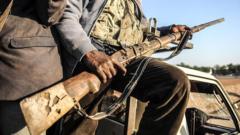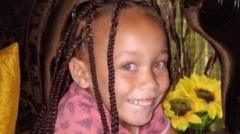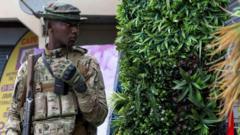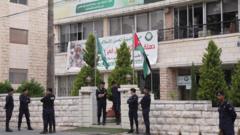Nigeria's government has officially classified the militant group Lakurawa as a terrorist organization, highlighting growing threats in the region from various jihadist factions.
New Terror Threat: Nigeria Declares Lakurawa a Jihadist Group

New Terror Threat: Nigeria Declares Lakurawa a Jihadist Group
Nigerian authorities label new insurgent organization as terrorists amid rising security concerns
The Nigerian government has taken a decisive stand against the rapidly emerging militant group, Lakurawa, by declaring it a terrorist organization. This official label comes in response to the group's escalating activities, which include targeting local communities in north-western Nigeria and along the border with Niger. The new classification aims to tackle security threats posed by several armed groups, including the notorious Boko Haram and various kidnapping syndicates.
Lakurawa has ingrained itself into communities since its emergence in Sokoto and Kebbi states, initially positioning itself as a force against banditry. However, the group soon escalated its violent approach by enforcing strict mandates, such as flogging individuals for listening to music and making arbitrary checks on personal devices. This alarming shift has caught the attention of authorities, leading to a High Court submission that details the group's involvement in terrorism-related activities, such as cattle rustling and kidnapping.
As the government formally bans Lakurawa, Justice James Omotosho has expanded the focus to include similar groups across Nigeria, especially in the North West and North Central regions. This declaration grants security forces enhanced powers to counter the group's operations through arrests, surveillance, and asset freezes. The immediate goal is to disrupt Lakurawa's influence before it can reach a level comparable to that of Boko Haram, an organization infamous for its mass abductions and attacks on educational institutions.
While the Nigerian authorities step up their efforts to combat the threat of Lakurawa, there is growing anxiety among local populations about potential violence and social stigma associated with the group's designation, as many fear a repetition of past insurgencies that have significantly destabilized the region. As the situation develops, communities remain vigilant in the fight against the rising tide of extremism.
Lakurawa has ingrained itself into communities since its emergence in Sokoto and Kebbi states, initially positioning itself as a force against banditry. However, the group soon escalated its violent approach by enforcing strict mandates, such as flogging individuals for listening to music and making arbitrary checks on personal devices. This alarming shift has caught the attention of authorities, leading to a High Court submission that details the group's involvement in terrorism-related activities, such as cattle rustling and kidnapping.
As the government formally bans Lakurawa, Justice James Omotosho has expanded the focus to include similar groups across Nigeria, especially in the North West and North Central regions. This declaration grants security forces enhanced powers to counter the group's operations through arrests, surveillance, and asset freezes. The immediate goal is to disrupt Lakurawa's influence before it can reach a level comparable to that of Boko Haram, an organization infamous for its mass abductions and attacks on educational institutions.
While the Nigerian authorities step up their efforts to combat the threat of Lakurawa, there is growing anxiety among local populations about potential violence and social stigma associated with the group's designation, as many fear a repetition of past insurgencies that have significantly destabilized the region. As the situation develops, communities remain vigilant in the fight against the rising tide of extremism.

















